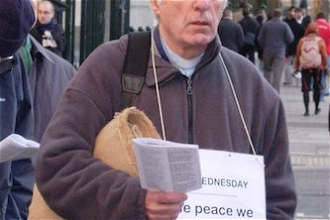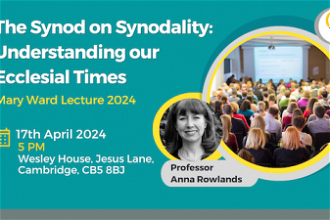Text: 'Living Simply in an age of austerity'
Summary of a Talk by Fr Rob Esdaile to National Justice & Peace Network Crawley, February 21, 2009
Introduction: 'Live Simply' is a great slogan. The challenge is to show people that the first word is not in competition with the second; that this simplicity may enhance, not diminish life. The question emerges why we should live simply and (moreover, in a very technological age) of what sort of 'simplicity' we have in mind. Any future simplicity cannot be a Luddite, pre-digital 'arts-and-crafts' simplicity. Many will remain over-stimulated and over-communicated and only a minority will seek inner silence or try to march to the beat of a different drum. Our job, amidst our busy-ness and activism, is to become that minority.
Live Simply Before The Crash: The timing of Live Simply was dictated by the 40th anniversary of Paul VI's Populorum Progressio (1967). Back then, living 'simply, sustainably and in solidarity' seemed like a modest act of resistance to the ideology of the markets. It put a small question-mark alongside the overweening self-confidence of our culture, and invited ordinary people to make simple pledges to do something that would both make themselves think and mark them out from the herd caught up in rampant consumerism.
A Failure Of Discernment: Now we are in recession Live Simply looks rather different. The old order was not only unjust but unsustainable, even in the narrow terms of the old economic orthodoxy. Yet we as Church by-and-large failed to anticipate the storm or to warn our neighbours as good pastors should have done. (cf. Ezek 3.17-18). We did not witness effectively to an alternative future more attuned to the values of the Kingdom of God, although John XXIII and Vatican II called us to "read the signs of the times", while Rev 2.7, etc told us to listen to "what the Spirit is saying to the Churches." Catholic Social Teaching's insistence on the priority of Labour over Capital (RN nn.16-17) should have been applied more explicitly to the financial sector; while the condemnation in the Roman Catechism of the Council of Trent easily applies to many 'derivative' financial 'products': 'To lend at usury is to sell the same thing twice, or more exactly to sell what does not exist.' Recent development of banking is a clear instance of 'structures of sin' (SRS n.37)
Moving On Simplicity, Sustainability and Solidarity: Looking to the future, Live Simply can be part of the solution to our crisis. But our view of it is radically altered. Living simply is forced on people by economic circumstance (after years of over-consumption). We recognise that, as a country, we were living un-sustainably, beyond our means. And solidarity is no longer going to be about a token gestures towards distant lands but something experienced much closer to home. Live Simply could become a tool for making sense of what is happening in the current crisis and helping people develop a spirituality to cope with the experience. Nothing has proved secure because we had created a world of illusion. The loss of confidence (and its consequences) is breathtaking. Yet from a theological point-of-view, there is something healthy going on here, amidst the pain. We are being reminded of the fundamental truth of our humanity that we are contingent beings, creatures, vulnerable and inter-dependent. (Mt 6.17, 31-33) The question is how we can re-appropriate for ourselves as believers this ancient and divine wisdom; and how we can draw from this an ethical programme to share with all, believers and non-believers alike.
A Pauline Perspective: It is as though we had bought into the economic equivalent of Justification by Works. Justification by Works is a reliance on our achievements, establishing our own respectability, our own goodness, our own position in the sight of God. Conversely, Justification by Faith is, firstly, the recognition that we're simply not capable of that degree of performance; that we can only rely on God's mercy; secondly, and more importantly, that we may do so - that we don't need to earn God's acceptance, which comes as pure grace. We can't simply establish our own prosperity. Individuals and superpowers alike are entirely dependent on others. We remain individually mortal and collectively vulnerable. That truth, our contingency, rules out both egocentrism and isolationism as responses to the financial crisis. But it also provides the basis for a renewed ethics of solidarity.
Paul wrote to the Philippians: "I know how to be poor and I know how to be rich too. I have been through my initiation and now I am ready for anything anywhere: full stomach or empty stomach, poverty or plenty. There is nothing I cannot master with the help of the One who gives me strength." (Phil 4.12-13) We all need to learn that lesson in order to flourish as people during the recession. Believers should know intuitively that possessions are not in themselves the basis for our sense of well-being. Our value, dignity and giftedness are not diminished by unemployment or financial difficulty (or infirmity or old age) and we dare to claim neither need our joy be. "Contentment is indeed a quiet secret known and cherished only by the few." (M. Bockmuehl). Our task is to share that secret by the witness of our lives.
Teaching Contentment:
The significant phrase in the Philippians passage is this: "I have been through my initiation". The equanimity with which Paul can face both feast and famine derives, fundamentally, from his experience of the humiliated and Risen Christ (Phil 2.6-11); but also from his experience of the Christian community, where material possessions were viewed in a way that contrasted with the contemporary mores. The social divisions expressed at the Eucharists of the Corinthian church (and which Paul condemns in 1 Cor 11) certainly show that the communist model of Christian community living which Luke reports in Jerusalem (Ac 2.44-5) was not universally adopted; yet Paul goes on to express his confidence in the generosity of those self-same selfish Corinthians in the collection for the 'poor' of Jerusalem (2 Cor 8-9).
We, in our day, need to offer a similar initiation into a life of contentment, which must involve training people in the art of detachment, how not to be defined by possessions or prestige, how not to be consumed by our consumption. That's not just a tool for surviving recession, though. It's also a way of living the second element in the Live Simply Credo sustainability. The acquisitive society cannot live sustainably. All advertising is predicated on stimulation of the unknown need. Consumerism depends on dissatisfaction. Consumerism is also inherently wasteful, assured that we shall all throw things away, not because they are worn out but because something 'better' has come along. And it is always predicated on growth. So when we talk of sustainability we do, as a matter of fact, become enemies of the system, subversive, dangerous. We are a real threat to the economic well-being of the nation. The argument that we ought to be out there consuming for the good of the nation has an element of truth. It makes economic sense. I just happen to suspect that it's going to destroy the planet. And if we do not witness to another possibility, another way of configuring the economy, not for growth but for sufficiency, who will do so?
Prophetic Living: Seeking first God's Kingdom and God's Righteousness means living prophetically, letting ourselves be out of step in order to create spaces where God's Reign becomes tangible, however fleetingly. Of course, the vision will be distorted and inadequate, because the misty mirror-image is all that is possible in the here-and-now, as St. Paul perceived (1 Cor 13.12). Yet the prophetic act is not to be underestimated. Peace Protesters, environmental protesters, direct action of various sorts, advocacy of the unfashionable, visible choices (like riding a bike, ethical shopping, recycling), joining civic and political organisations in an age of 'non-joiners' Like them or not, they open a space for questioning and give visibility to the issues which otherwise remain unchallenged and unexplored. They follow in the uncomfortable footsteps of the prophets (Jer 19.10; Ezek 38.15-27; Hos 1.3); and, above all of Jesus eating with sinners (Mk 2.15-17), choosing twelve disciples to represent the in-gathering of the Twelve Tribes of Israel (Mk 3.13-19), cleansing the Temple (Mk 11.15-19), washing his disciples' feet (Jn 13.1- 15) and celebrating Eucharist (Mk 14.22-25). And we know what happened to Jesus; so, while we shouldn't be looking for confrontation, neither should we be surprised if it should happen to come our way.
The Sacrament Of Living Simply: Our Sacrament of Simplicity and Sustainability and Solidarity is the Eucharist, which speaks of a life Christ's life of utter solidarity; of a communion which is entirely gift; of a way of living which is reverent, giving thanks for the fruits of the earth, and therefore sustainable. The Eucharist uses elements which are entirely ordinary. It can comprehend both boom and bust, answering to every emotion and drawing in the best of times and the worst of times the bread of affliction and the wine of human joy.
Our action in the Eucharist, our contribution, is to make ourselves empty-handed, to give over our gifts, to lose ownership of them, to entrust them to the Lord. We confess and celebrate our contingency, our utter dependence and inter-dependence; because that is the only way to make ourselves aware of our hunger; because that is the only way to become ready to receive a new vision of the world, a vision in which all people share at the table and there is enough to go round because (and only because) people share the little they have five loaves and two fish and they all ate as much as they wanted, and there were twelve baskets of scraps collected afterwards.
Fr Rob Esdaile is parish priest of Our Lady of Lourdes Church in Thames Ditton, Arundel and Brighton Diocese.
The full text of the talk can be found on the Resources page of the National Justice and Peace website - www.justice-and-peace.org.uk
Also, see: www.livesimply.org.uk




















